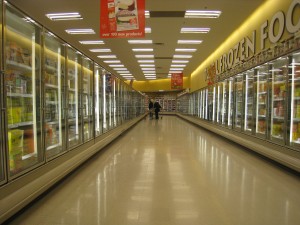I am tired of people complaining about the cost of food. I know, I sound like a terrible human being. Yes, prices are going up, and of course food has to be affordable. But we are pretty spoiled here in North America compared to the rest of the world when it comes to many things, and the price of food is no exception.
Take a minute to consider how much (or little) of our income that we actually spend on food compared to other nations:
• USA 9.6%
• UK 11%
• Japan 17%
• South Africa 27%
• India 53%
If you’re in North America, you’re spending less than 10% of your income on food. This figure used to be much higher. But believe it or not, it has been steadily decreasing over the past 90 years.
And now, after all this time, the landscape is changing.
The UN Food and Agriculture Organization (FAO), led by newly appointed Jose Graziano da Silva, says the increase is due to bad weather (droughts and floods in food producing areas), high demand, and a switch to higher protein diets. There was much talk about food shortages in 2009, and in February 2011, the FAO Food Price Index reached an all time high — this is a measure of the monthly change in international food commodity prices.
Mr. Graziona says prices are going to stay high — and volatile. And volatily, he says, is worse than high prices, because farmers are hesitant to invest in agriculture for fear of not making their return. Graziano partly blames this volatility on the “financialization” of key commodities by financial markets, i.e. speculation.
The price of food in Canada is rising, but we will not likely feel it until the end of the year, when according to the Globe & Mail — the rising cost of wheat, soy, corn, sugar and vegetable oil will have trickled down and be reflected in supermarket prices.
The UN points the finger for all this at the rising cost of crude oil. While it’s true the cost of wheat has doubled, the cost of wheat makes up only 15 cents of the price of a loaf of bread. The rest comes from processing, packaging, overhead and transportation.
Rising fuel prices are much more of a factor. 1L gasoline is up by 20% from last year, and the price of diesel, used by most transport trucks, is up 30% from last year. This will have a major trickle down effect on… well, everything.
So what can you do to minimize the strain? There are different ideas out there floating around. Start growing your own food during the warmer months to reduce food bills. Buy as local as you can to minimize the distance the food must travel. Buy food that has as little processing and refining as possible — to avoid the costs that each of these stages adds on.
One piece of advice was deceptively simple and made me laugh:
Use all the plant. Save the bones for soup. Freeze and can and jam and pickle the food you do have to stretch it as far as it will go — because the current lifestyle to which we have become accustomed may well be changing.
